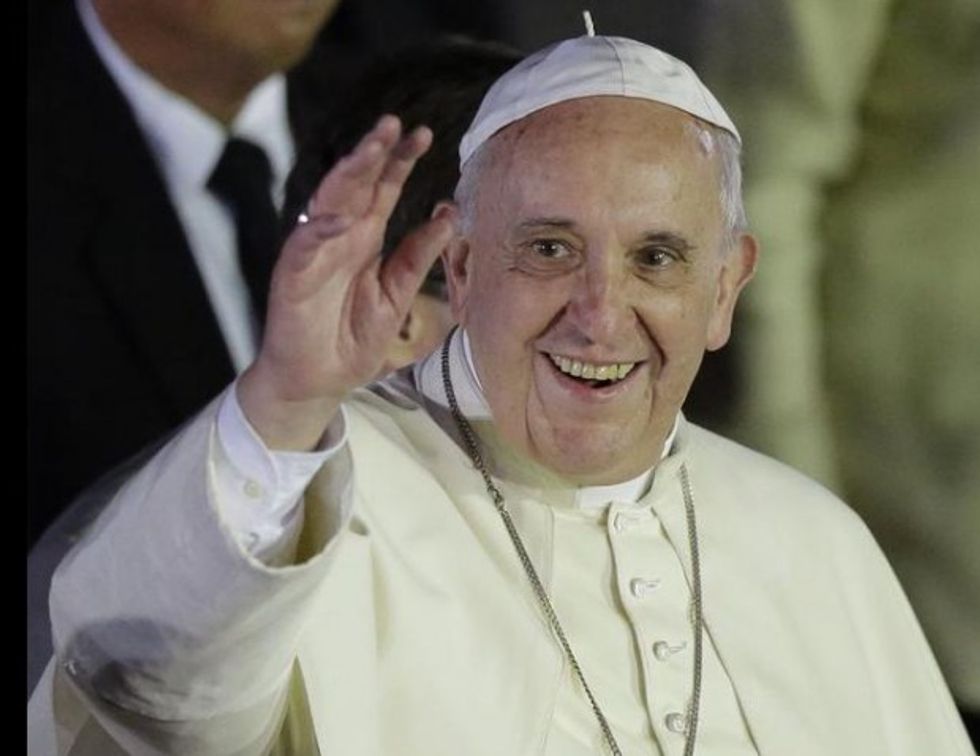
Pope Francis delivers his speech during his weekly general audience in St. Peter's Square at the Vatican, Wednesday, Oct. 29, 2014. (AP Photo/Alessandra Tarantino)

VATICAN CITY (TheBlaze/AP) — A few days before the official release of Pope Francis' draft encyclical on climate change, an Italian newsweekly published a leaked copy, sending people into a flurry to translate what it has to say.

The highly anticipated 191-page "Laudato Si" (Be Praised) was posted online by L'Espresso Monday but is not the final version, Vatican spokesman Rev. Federico Lombardi said, noting that the official draft of the document will be released Thursday as planned. But the current copy still reveals some of the thoughts held by the leader of the Roman Catholic Church regarding the state of the Earth's environment, humanity's role in it and what is to be done about it in the future.
Pope Francis says in the draft that climate change is "mostly" due to human activity and the burning of fossil fuels. He also has a message for those who might deny that climate change is happening or downplay the role that human activity has contributed toward it.
"Attitudes that hinder the ways of solution, even among believers, ranging from denial of the problem of indifference, to [comfortable] resignation, or blind faith in technical solutions. We need new universal solidarity," Francis wrote (translated via Google Translate). "As they said the bishop there in South Africa, "the talent and the involvement of everyone is needed to repair the damage caused by humans on the creation of God."
The L'Espresso draft, which was published in galley form, makes many of the same points that Francis and his advisers have been making in the months-long rollout of the document.
In the draft, Francis lays out both the scientific and the moral reasons for protecting God's creation, noting that the poor are already suffering the most from air pollution and toxic dumping and will continue to bear the brunt of rising sea levels and extreme weather conditions. The draft says population growth isn't to blame for ecological problems but rather the consumerist, wasteful behavior of the rich.
Francis backs up his comments with science showing the impact on the planet of the continual loss of biodiversity in Amazonian rainforests, the melting of Arctic glaciers, the overfishing of the seas and the pollution of the world's water supply.
Francis has said he wanted the encyclical to be read by everyone — not just Catholics — and he notes in the introduction that the document is now part of the formal teaching "magisterium" of the Catholic Church. That could be read as a warning of sorts to climate skeptics, including many Catholics in the U.S. who have suggested they simply will ignore the encyclical since the pope's views on the environment clash with their doubts about climate change.
In September, Francis will travel to the United States and address both the United Nations and the U.S. Congress. Some Republicans are vocal climate skeptics and many conservatives have criticized the pope for even taking up the environment in an encyclical, the most authoritative teaching document a pope can issue.
Francis has said previously that climate change is "mostly" man-made and that humankind has a moral imperative to radically change its behavior to protect the planet for future generations — as well as to prevent the poor from suffering due to the sins of the rich.
In the draft, the pope repeats that scientific studies have shown that global warming is due "mostly" to human activity and the emission of gasses that prevents heat from dispersing in the atmosphere. He says that is worsened by a development model based on using fossil fuels as the main source of energy in the world.
In the mean time, the Vatican is also trying to figure out who leaked the encyclical to the newsweekly, deflating the release of the most anticipated and feared papal document in recent times.
L'Espresso's veteran Vatican correspondent Sandro Magister told The Associated Press that his editor, not he, obtained the document and decided to publish it. Magister said he just wrote the brief introduction.